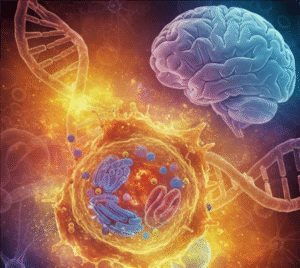Seminar: Biochemistry | September 17 | 3:30 p.m.-4:30 p.m. | Room 1.3.33 A
Wolfgang Link, Principal investigator at CSIC, Instituto de Investigaciones Biomédicas Alberto Sols (CSIC-UAM), Arturo Duperier 4. 28029-Madrid, Spain

Non-Covalent CRM1 Inhibitors as a Precision Strategy Against Glioblastoma
Host: Miguel Machuqueiro
Glioblastoma (GB) is among the most lethal human cancers, driven by highly redundant and adaptive signaling networks. Targeted inhibition of individual pathways has yielded limited benefit, underscoring the need for strategies that simultaneously disrupt multiple oncogenic drivers. Because many key GB regulators depend on intracellular localization, blocking their nuclear export via inhibition of the export receptor CRM1 offers a way to affect multiple factors in parallel. CRM1 is frequently overexpressed in GB and is associated with therapy resistance and poor patient outcomes. Selinexor, the first FDA-approved CRM1 inhibitor, is currently under investigation in GB but is limited by severe dose-dependent toxicities arising from its covalent binding mechanism. In contrast, non-covalent inhibition of CRM1 is expected to reduce toxicity and thereby improve therapeutic dosing, efficacy, and safety. Here, we present our progress in the discovery and development of novel CRM1 inhibitors using an integrated approach that combines computational chemistry–guided design, medicinal chemistry, tumor biology, and assay development.
References:
[1] Princiotto S., Jiménez L., Domínguez L., . Sequeira J.G.N., Mourato C., Orea-Soufi A., Santos B, Dallavalle S., Machuqueiro M., Ferreira B.I. and Link W. (2025) Chromenone derivatives as CRM1 Inhibitors for Targeting Glioblastoma. Chembiochem e202500195. doi: 10.1002/cbic.202500195.
[2] Jimenez L., Mayoral‐Varo V., Amenabar C., Ortega J., Sequeira J.G.N., Machuqueiro M., Mourato C., Silvestri R., Angeli A., Carta F., Supuran C.T., Megias, D., Ferreira B.I. and Link W. (2022) Multiplexed cellular profiling identifies an organoselenium compound as an inhibitor of CRM1-mediated nuclear export. Traffic 23, 587-599, doi: 10.1111/tra.12872.
[3] Calissi G., Lam E.W.F. and Link W. Therapeutic strategies targeting FOXO transcription factors. Nature Reviews Drug Discovery 2021; 20, 21-38.
[4] Ferreira B.I., Cautain B., Grenho I. and Link W. Small molecule inhibitors of CRM1. Frontiers in Pharmacology 2020; 11, 625.
Biosketch:
Dr. Link is a CSIC Group Leader at the Sols-Morreale Biomedical Research Institute (IIBM/CSIC-UAM) in Madrid, Spain, where his research focuses on understanding and therapeutically targeting the mechanisms underlying human cancer and aging. He also holds appointments as Profesor Honorario at the Universidad Autónoma de Madrid (UAM) and as Guest Principal Investigator at the Algarve Biomedical Center Research Institute (ABC-RI). In addition, he is co-founder of Refoxy Pharma GmbH, a biotechnology company established in Cologne, Germany in 2020, dedicated to developing drugs for age-related diseases. Since its founding, Refoxy Pharma has secured over €11 million in private investment. Dr Link counts with more than 25 years of experience in basic and translational biomedical research. He holds three patents (one licensed to Sanofi), published three books, seven book chapters and over 90 articles (4 more under revision), 10 as the first author, and over 40 as senior author. He published articles (selection) in Nature, Oncogene, Drug Resistance Updates, PNAS, Nature Reviews Drug Discovery, Trends in Biotechnology, EMBO J, The Lancet Oncology, Cell Death and Disease, Drug Resistance Updates and Aging Cell. His work has been cited 7800 times. He also serves as an editorial board member of prestigious, international peer-reviewed journals. Dr Link has a proven track-record in drug discovery and drug development and has recently published a textbook on that topic (Link W. Springer Nature 2019). The Drug development efforts in the link lab have been focussed on four main targets: PI3K (Kinase), FOXO3 (Transcription Factor), CRM1 (Nuclear Export Receptor) and TRIB2 (Pseudo-Kinase). He is a serial entrepreneur and Co-founder of exCELLerate S.L., semi-finalist VentureLab (Edition 2009-10), third prize Fundación Everis, Madrid 2010 and Refoxy Pharma, a biotech company dedicated to developing pharmaceuticals to target FOXO proteins. Notably, Refoxy has recently secured a substantial second investment round in collaboration with a prominent German pharmaceutical company. Dr Link acts as an expert evaluator for many international funding organisations and as a peer-reviewer for many prestigious journals. He also served as an advisor for a project (Trendington – PREFET) funded by the European Union, a pharma company (Bayer AG), an investment fund (Apollo Ventures) and a doctoral program (TubInTrain, EU). Dr Link participated in several COST actions (BM1204, CM1407, CA17104, IG17104) and organized international conferences and seminar series, e.g. Organizer/Chair Panel Discussion with Vera Gorbunova/Joris Deelen (December 2022), Webinar with Robert A. Weinberg, Whitehead Institute for Biomedical Research (June 2022). Importantly, the Link group was one of the first to identify CRM1 inhibitors and ever since was one the forefront of CRM1 drug discovery. Dr Link obtained his PhD degree from the University of Hamburg, followed by a postdoc at CNB (Madrid), before joining the pharma company EleGene AG (Germany) as a senior scientist. In 2001, he moved to Madrid joining the newly-founded CNIO where he was promoted to head the screening group in 2010. Before joining CSIC, he held the position of an Assistant Professor and Head of the Department of Oncobiology at the Faculty of Medicine (University of Algarve, Faro, Portugal) for seven years.